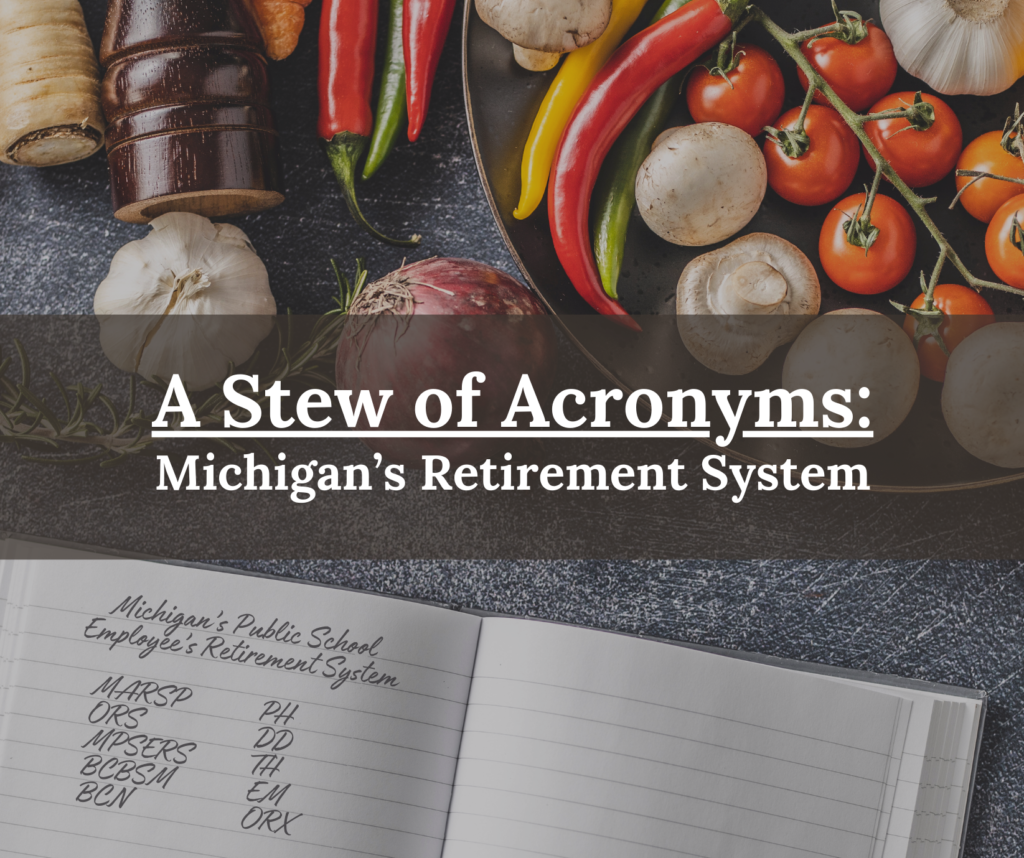
A good soup or stew takes variety to make, but when it’s a stew of acronyms so interconnected to our retirement lives, it can be tough to sort out the individual ingredients. Most MARSP members can quickly recite that M-A-R-S-P stands for Michigan Association of Retired School Personnel, but may hesitate when asked how it relates to the shorter acronym O-R-S or the longer one M-P-S-E-R-S.
For retirees from Michigan public schools, ORS, or the Office of Retirement Services, could be considered the “soup stock,” to which we add a number of other components. ORS is the state agency that administers retirement programs for all of the state’s employees, from public schools, to state police, to state government workers and judicial employees. Its assets currently total more than $73.3 billion. In fiscal year 2018, ORS paid out more than $7.4 billion in pension and health care benefits, which went to one out of every nine Michigan households.
MPSERS (Michigan Public School Employees Retirement System) is the largest of the ORS retirement programs, representing more employees or retirees than any of the other state employee systems. We might consider MPSERS the “main ingredient” to our ORS soup stock. MPSERS administers several pension plans for public school employees, including “defined benefits,” “defined contribution” and two hybrid plans.
At the national level, we also need to include SSA (Social Security Administration), which provides financial benefits to retirees and their survivors and people with disabilities. In Michigan, 2.2 million people receive SSA benefits. That’s more than 20 percent of the state’s 10 million residents.
Now that we’ve figured out our stew’s main ingredients, the pension and health care programs that give retirees financial security and peace of mind, let’s add other elements to make the concoction even healthier.
Long ago, state leaders realized that to give retirees a secure, dignified retirement, they also needed access to affordable healthcare. Many healthcare acronyms feed our healthcare benefits, including BCBSM, BCN, PH, DD, TH, EM, ORX, but Medicare is one of the few that is rarely abbreviated. For those over the age of 65, Medicare is the federal health insurance program currently serving about 44 million Americans and about 2 million Michiganders (nearly 21 percent of the state’s population).
Medicare doesn’t do it all, however. Michigan’s largest health insurance provider is BCBSM (Blue Cross Blue Shield of Michigan), a nonprofit mutual company that got its start in Texas in the 1920s and has served Michigan customers since 1938. The company became Blue Cross Blue Shield in the mid-1970s and formed BCN (Blue Care Network), now the largest HMO (health maintenance organization) in the state. HMOs are member organizations that provide patient wellness and preventive health care by only covering in-network physicians and facilities. BCN currently serves about 900,000 Michigan residents.
Then there’s PH or Priority Health, a nationally recognized nonprofit health benefits company serving 1 million members in Michigan.
As our retirement soup continues to bubble with pension and health care programs, we need to add a few more ingredients to thicken the broth. Health care for Michigan retirees also includes dental, vision, hearing, and prescription drug services. These are provided by DD (Delta Dental), EM (EyeMed), TH (TruHearing), and ORX (Optum RX).
Delta Dental is one of the largest dental plan administrators in the U.S., serving customers in every state. Delta Dental Plan of Michigan is a member of the Delta Dental Plans Association. EyeMed is the state’s vision plan insurance carrier. It is the umbrella for about 5,200 vision care providers in Michigan. Retirees also benefit from TruHearing, the state’s plan for hearing coverage. TruHearing is a national Blue Cross Blue Shield participating provider. Retirees covered under a BCBSM PPO also receive OptumRX as their pharmacy benefit management company for prescription drugs. (Click here for more information about each of these healthcare entities)
Now that we’ve covered the pension and health care acronyms, our retirement soup requires some spices. In addition to MARSP, several other state and national organizations collaborate with MARSP to serve Michigan public school retirees – AMBA, endorsed by MARSP, offers long-term care insurance policies, MASA (air and ground ambulance plans), life insurance and more; NRTA (National Retired Teachers Association), a national organization representing retired educators age 50 and up, focused on protecting educators’ financial security; AARP Michigan (American Association of Retired Persons of Michigan), the state branch of AARP, a nonpartisan advocacy organization representing people 50 and older. Each organization offers services designed to improve the flavor of retirees’ quality of life.
It’s a challenge to keep track of the acronym ingredients, but don’t worry – MARSP is always watching the pot! We’re the only organization in Lansing with a full-time presence advocating for the interests of public school retirees. It’s MARSP’s mission to secure ingredients of the highest possible standards so that the retirement system stew remains robust and nourishing.

